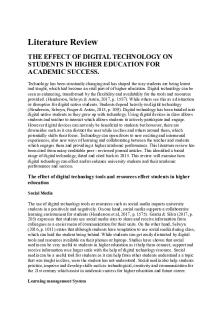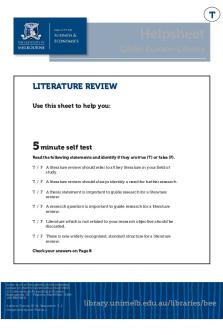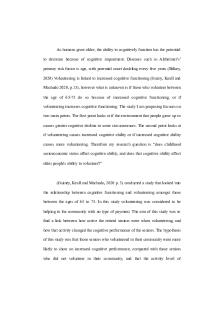Literature Review PDF

| Title | Literature Review |
|---|---|
| Author | Samantha Hayward |
| Course | Psychology |
| Institution | Secondary School (New Zealand) |
| Pages | 5 |
| File Size | 85.8 KB |
| File Type | |
| Total Downloads | 63 |
| Total Views | 161 |
Summary
Literature review for psychology...
Description
As humans grow older, the ability to cognitively function has the potential to decrease because of cognitive impairment. Diseases such as Alzheimer’s’ primary risk factor is age, with potential onset doubling every five years (Bilkey, 2020) Volunteering is linked to increased cognitive functioning (Guiny, Keall and Machado 2020, p.13), however what is unknown is if those who volunteer between the age of 65-75 do so because of increased cognitive functioning, or if volunteering increases cognitive functioning. The study I am proposing focuses on two main points. The first point looks at if the environment that people grow up in causes greater cognitive decline in some circumstances. The second point looks at if volunteering causes increased cognitive ability or if increased cognitive ability causes more volunteering. Therefore my research question is “does childhood socioeconomic status affect cognitive ability, and does that cognitive ability affect older people's ability to volunteer?”
(Guiney, Keall and Machado, 2020 p. 3) conducted a study that looked into the relationship between cognitive functioning and volunteering amongst those between the ages of 65 to 75. In this study volunteering was considered to be helping in the community with no type of payment. The aim of this study was to find a link between how active the retired seniors were when volunteering, and how that activity changed the cognitive performance of the seniors. The hypothesis of this study was that those seniors who volunteered in their community were more likely to show an increased cognitive performance, compared with those seniors who did not volunteer in their community, and that the activity level of
volunteering would help to explain the reasoning behind increased cognitive performance for those who volunteered. The participants were asked to provide their volunteering activity, activity engagement and their wellbeing. They were then asked to take different computerized tests that tested their cognitive ability and function. The results found that there was evidence to support the idea that seniors who volunteer in their community at least one time per month have a better working memory, along with better social and cognitive activity (Guiney, Keall and Machado, 2020, p. 10-11). The study did not find satisfactory evidence supporting the hypothesis that activity was the underlying reason that volunteering created better cognitive functioning amongst retired 65-75 year olds. The authors concluded that although the current study provided some insight into volunteering and cognitive abilities, future research would need to find the underlying causes of the link, as activity did not seem to be correlated.
My argument is that early childhood socioeconomic status, along with a late diagnosis of certain cognitive impairments cause older people not to volunteer because of cognitive decline. The study discussed above did not control for the variable that participants may have volunteered because of their increased cognitive function. The study I am presenting in this paper looks at whether seniors aged 65-75 have an increased cognitive ability because of volunteering, or if participants volunteer because of their increased cognitive ability. I believe that participants who volunteer, volunteer because of an increased cognitive ability. In my opinion, those who have cognitive impairments, either diagnosed or
undiagnosed, have a lesser ability to volunteer successfully. As discussed above, the potential for dementia, specifically Alzheimer’s doubles every five years after the age of 65 years old. The early symptoms for dementia include confusion and memory loss, disorientation, change in personality and difficulties completing routine tasks. (Brodaty 1999, p. 44) found that the cognitive symptoms of Alzheimer's disease appear and worsen before a diagnosis is usually given, and it can be up to 3 years between the onset of symptoms and when a diagnosis is given. Between those three years, senior citizens will have cognitive impairment and decline, making them less likely to be able to volunteer, but still considered cognitively unimpaired because they haven't been diagnosed yet. In relation to the Guiney, Keall and Machado study, participants could have had early stage Alzheimer’s, with cognitive symptoms present, but without a diagnosis, creating an illusion that not volunteering causes cognitive decline, when cognitive decline and impairment was already present. This is a variable that my study will take into account. Another weakness in the present study was the lack of variability regarding the location of the participants. The study was conducted in New Zealand, which is a developed country. (Shirbekk, Loichinger, and Weber 2011, p.771) conducted a study about how different environments in the world can produce different cognitive abilities amongst elderly people. They suggest that environmental factors such as nutrition, quality of duration of education, possible exposure to disease, and sickness and social activity patterns play a role in the cognitive ability of people. Therefore, the results that were gained in New Zealand, in my opinion may be different from those results that could be gained from developing countries, or
in other places in New Zealand, where the participants may have grown up in different circumstances where environmental factors are different. To counteract this weakness, I will ask participants what their socioeconomic status was growing up using the PCS3 socioeconomic status questionnaire. The risk of cognitive decline from a low socioeconomic status is corroborated with the risk factors of dementia which include a lack of education, obesity and social isolation.
Volunteering has been linked to an increased cognitive ability amongst older adults aged 65-75. Cognitive ability has also been linked to childhood socioeconomic status. My research question is “does childhood socioeconomic status affect cognitive ability, and does that cognitive ability affect older people's ability to volunteer?”. I believe that some older adults don't volunteer because of a cognitive decline which is caused by childhood socioeconomic status and late diagnoses of cognitive impairments. This argument is supported by Brodaty (1996) who found that Alzheimer's Disease was not diagnosed until up to 3 years after the initial onset of symptoms, and by Shirbekk et al (2011) that found that different environments can cause faster cognitive decline. Word Count: 990
References Brodaty, H. (1999). Realistic expectations for the management of Alzheimer’s disease. European neuropsychopharmacology. Guiney, H., Keall, M., & Machado, L. (2020). Volunteering in older adulthood is associated with activity engagement and cognitive functioning Aging. Neuropsychology, and Cognition. Shribekk, V., Loichinger, E., & Weber D. (2011). Variation in cognitive functioning as a refined approach to comparing aging across countries. PNAS...
Similar Free PDFs

Literature Review
- 10 Pages

Literature Review
- 9 Pages

Literature Review
- 6 Pages

Literature Review
- 32 Pages

Literature Review
- 9 Pages

Literature Review
- 5 Pages

Literature Review
- 15 Pages

Literature Review
- 4 Pages

Literature Review
- 16 Pages

Systematic Literature Review
- 9 Pages

Mobile Learning Literature Review
- 26 Pages

Literature review on IFRS
- 11 Pages

Literature Review - guidelines
- 4 Pages

Chapter-2: LITERATURE REVIEW
- 48 Pages

Distance Education Literature Review
- 12 Pages
Popular Institutions
- Tinajero National High School - Annex
- Politeknik Caltex Riau
- Yokohama City University
- SGT University
- University of Al-Qadisiyah
- Divine Word College of Vigan
- Techniek College Rotterdam
- Universidade de Santiago
- Universiti Teknologi MARA Cawangan Johor Kampus Pasir Gudang
- Poltekkes Kemenkes Yogyakarta
- Baguio City National High School
- Colegio san marcos
- preparatoria uno
- Centro de Bachillerato Tecnológico Industrial y de Servicios No. 107
- Dalian Maritime University
- Quang Trung Secondary School
- Colegio Tecnológico en Informática
- Corporación Regional de Educación Superior
- Grupo CEDVA
- Dar Al Uloom University
- Centro de Estudios Preuniversitarios de la Universidad Nacional de Ingeniería
- 上智大学
- Aakash International School, Nuna Majara
- San Felipe Neri Catholic School
- Kang Chiao International School - New Taipei City
- Misamis Occidental National High School
- Institución Educativa Escuela Normal Juan Ladrilleros
- Kolehiyo ng Pantukan
- Batanes State College
- Instituto Continental
- Sekolah Menengah Kejuruan Kesehatan Kaltara (Tarakan)
- Colegio de La Inmaculada Concepcion - Cebu
